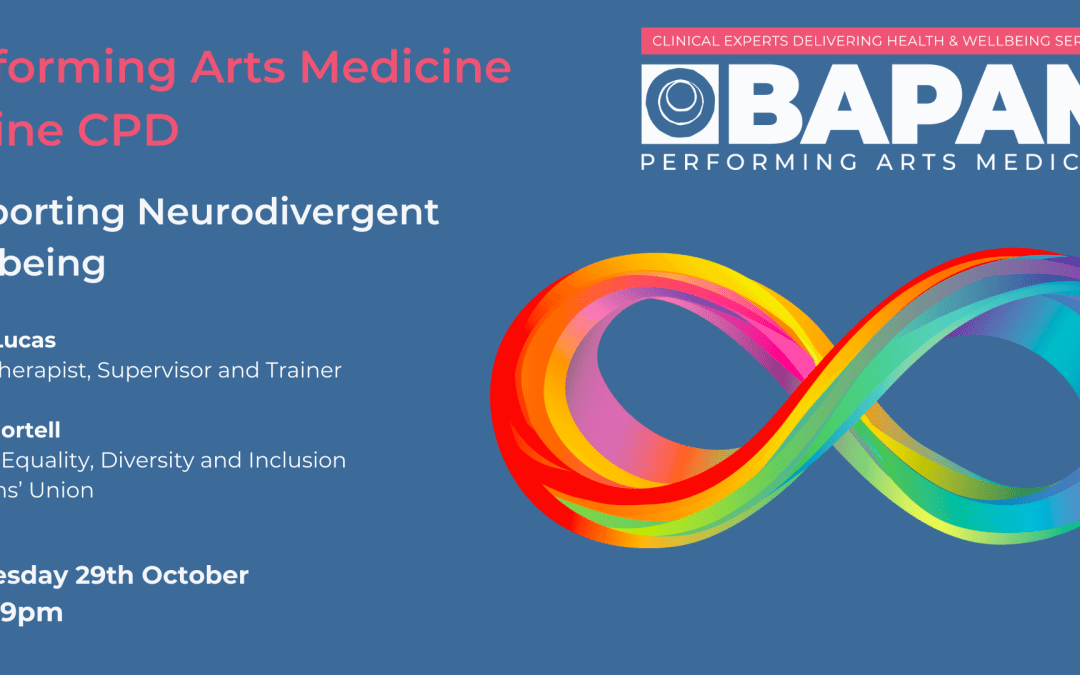It is estimated that around 1 in 5 people in the UK are neurodivergent and reports such as the Musicians’ Census from the MU and Help Musicians, and the Film and TV Charity’s Looking Glass report indicate that there is a higher percentage of neurodivergent people working in the performing arts. Focusing on neurodivergent wellbeing, our October CPD explores topics including:
- the positives and challenges of working in the creative sector
- how practitioners can effectively support neurodivergent clients
- lived experience of neurodivergent identity
- how we improve accessibility of work and performance environments, remove barriers to participation, and effectively share information.
We are delighted to be joined by psychotherapist and supervisor, Louise Lucas, and the MU’s Head of EDI, John Shortell.
–
Louise Lucas, Psychotherapist, Supervisor and Trainer
Louise Lucas is a queer and multiply neurodivergent Therapist, Supervisor and Trainer. She works predominantly with neurodivergent clients and therapists, exploring their own neurodivergent identities and figuring out how to curate a life that works for them.
Most recently, she has been developing a model of neurodivergent wellbeing based on her lived experience, alongside her professional and academic knowledge. Working with the strands of knowledge, understanding and acceptance and how they can be woven together through self-compassion, this model forms the foundation of a package of resources and training to help therapists continue to support neurodivergent clients in an affirming and inclusive way.
In this workshop Louise will share how she works with neurodivergent clients and supports them to curate a life that works for them, rather than one where they must continually change to fit societal expectations.
This way of working is based on the Two Spirals model of neurodivergent wellbeing that Louise has developed based on her lived experience as well as her professional and academic knowledge.
This model makes space for varied neurodivergent experiences and intersectional identities while providing a framework to support clients to make meaningful and lasting change.
We will explore the importance of understanding the context in which our clients (and we) exist and how the systems and structures around them may have been internalised and used to create barriers to self-acceptance and compassion.
–
John Shortell, Musicians’ Union Head of Equality, Diversity and Inclusion
John Shortell is Head of Equality, Diversity & Inclusion at the Musicians’ Union. John works with MU members from all underrepresented and marginalised communities and the wider music industry to tackle non inclusive and discriminatory behaviours and promote inclusive practice.
As part of his role John works on the MU’s Safe Space service that provides a space for musicians to share instances of sexism, sexual harassment and sexual abuse in the music industry.
John is also a member of UK Music Diversity Taskforce and a Trustee of Homotopia, an arts and social justice organisation making a cultural impact through art and activism.
Using data from the Musicians’ Census we will discuss the proportion of neurodivergent people working in the music industry, some of the barriers and challenges neurodiverse musicians face and some of the ways that the music industry can be a positive workplace for neurodiverse musicians.
John will share some of the ways that the Musicians’ Union (MU) works with neurodivergent musicians and the music industry to make the MU and workplaces more accessible. The MU’s work with disabled musicians is informed by the social model of disability and uses a collective experience of discrimination and exclusion to challenge attitudes, beliefs and barriers created by society to support lasting change in the music industry.
–
BAPAM’s expert-led training events are ideal for healthcare and education practitioners working in the performing arts who wish to deepen their understanding and enhance their skills. We explore research, evidence and practice to treat and prevent common and complex health problems specific to artists, creators and performance professionals. We share knowledge and invite discussion on key topics in current performing arts medicine practice. Our approach is multidisciplinary: physiological and psychological care for healthy and sustainable creative practice.
Online sessions are held on the last Wednesday of the month from 7pm BST. Most sessions are recorded for ticket holders who cannot attend on the day (please check the event description).

